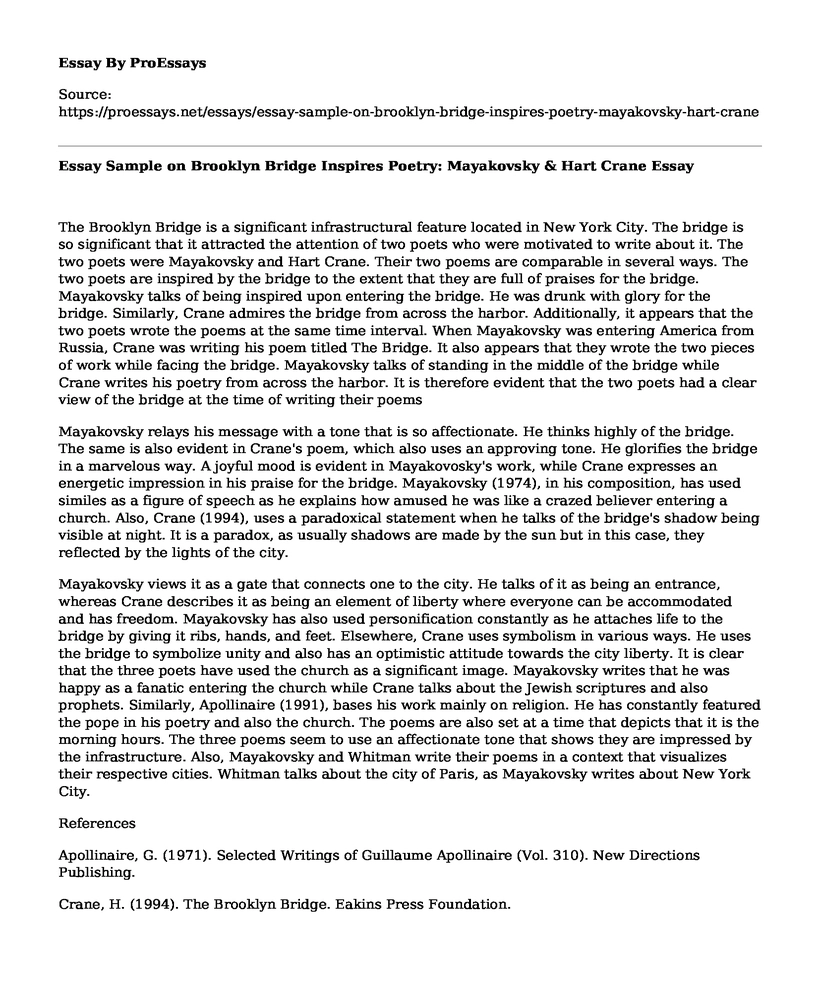The Brooklyn Bridge is a significant infrastructural feature located in New York City. The bridge is so significant that it attracted the attention of two poets who were motivated to write about it. The two poets were Mayakovsky and Hart Crane. Their two poems are comparable in several ways. The two poets are inspired by the bridge to the extent that they are full of praises for the bridge. Mayakovsky talks of being inspired upon entering the bridge. He was drunk with glory for the bridge. Similarly, Crane admires the bridge from across the harbor. Additionally, it appears that the two poets wrote the poems at the same time interval. When Mayakovsky was entering America from Russia, Crane was writing his poem titled The Bridge. It also appears that they wrote the two pieces of work while facing the bridge. Mayakovsky talks of standing in the middle of the bridge while Crane writes his poetry from across the harbor. It is therefore evident that the two poets had a clear view of the bridge at the time of writing their poems
Mayakovsky relays his message with a tone that is so affectionate. He thinks highly of the bridge. The same is also evident in Crane's poem, which also uses an approving tone. He glorifies the bridge in a marvelous way. A joyful mood is evident in Mayakovosky's work, while Crane expresses an energetic impression in his praise for the bridge. Mayakovsky (1974), in his composition, has used similes as a figure of speech as he explains how amused he was like a crazed believer entering a church. Also, Crane (1994), uses a paradoxical statement when he talks of the bridge's shadow being visible at night. It is a paradox, as usually shadows are made by the sun but in this case, they reflected by the lights of the city.
Mayakovsky views it as a gate that connects one to the city. He talks of it as being an entrance, whereas Crane describes it as being an element of liberty where everyone can be accommodated and has freedom. Mayakovsky has also used personification constantly as he attaches life to the bridge by giving it ribs, hands, and feet. Elsewhere, Crane uses symbolism in various ways. He uses the bridge to symbolize unity and also has an optimistic attitude towards the city liberty. It is clear that the three poets have used the church as a significant image. Mayakovsky writes that he was happy as a fanatic entering the church while Crane talks about the Jewish scriptures and also prophets. Similarly, Apollinaire (1991), bases his work mainly on religion. He has constantly featured the pope in his poetry and also the church. The poems are also set at a time that depicts that it is the morning hours. The three poems seem to use an affectionate tone that shows they are impressed by the infrastructure. Also, Mayakovsky and Whitman write their poems in a context that visualizes their respective cities. Whitman talks about the city of Paris, as Mayakovsky writes about New York City.
References
Apollinaire, G. (1971). Selected Writings of Guillaume Apollinaire (Vol. 310). New Directions Publishing.
Crane, H. (1994). The Brooklyn Bridge. Eakins Press Foundation.
Mayakovsky, V., Goluska, G., & Goluska, A. (1974). Brooklyn Bridge. Broadway Boogie Press.
Cite this page
Essay Sample on Brooklyn Bridge Inspires Poetry: Mayakovsky & Hart Crane. (2023, Mar 20). Retrieved from https://proessays.net/essays/essay-sample-on-brooklyn-bridge-inspires-poetry-mayakovsky-hart-crane
If you are the original author of this essay and no longer wish to have it published on the ProEssays website, please click below to request its removal:
- Harriet Jacob's Slave Narrative Essay
- The Character Analysis for the Main Character Walter Lee Younger
- Harry Potter and the Philosopher's Stone Essay
- Essay on Group Dynamics as Presented in the 12 Angry Men
- Essay Example on Child Narrator: Delivering Stories With Meaning
- Maverick, Uncle Carlos, and Fatherhood in The Hate U Give Paper Example
- Atlas Shrugged: What Happens When Producers & Giants Leave? - Free Essay







